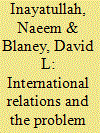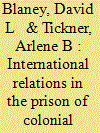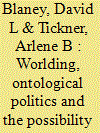|
|
|
Sort Order |
|
|
|
Items / Page
|
|
|
|
|
|
|
| Srl | Item |
| 1 |
ID:
114088


|
|
|
|
|
| Publication |
2012.
|
| Summary/Abstract |
The success of norms constructivists rests in part on their assertion of academic activism as a heroic aspect of intellectual life. Critics of this vision, however, insist on the complicity of norm scholars in creating and maintaining processes of global injustice. Frustrated with this criticism, Richard Price calls for answers to a simple question: can detractors go beyond mere criticism and provide a praiseworthy target toward which norms constructivists can aim? We respond to this challenge, first, by offering an internal critique of Price's logic. We suggest that Price and other norms entrepreneurs underplay the darker, colonial side of modern ethical life on which the successes of norms cascades depend. Second, we draw on Adam Hochschild's King Leopold's Ghost to contrast contemporary norms constructivists with the heroic characters represented in and by this book. Norms entrepreneurs, Edmund Morel and Roger Casement, successfully exposed Belgian atrocities in colonial Congo, and Hochschild himself brings this mostly forgotten history to light. Yet the narrative trajectory of these three heroes is tragic, compelling each to face their complicity in the very forces they resist. This tragic vision calls us not to celebrate but to resist the continuing legacies of colonial domination.
|
|
|
|
|
|
|
|
|
|
|
|
|
|
|
|
| 2 |
ID:
050711


|
|
|
|
|
| Publication |
New York, Routledge, 2004.
|
| Description |
xii, 276p.
|
| Standard Number |
9780415946384
|
|
|
|
|
|
|
|
|
|
|
|
Copies: C:1/I:0,R:0,Q:0
Circulation
| Accession# | Call# | Current Location | Status | Policy | Location |
| 047698 | 303.482/INA 047698 | Main | On Shelf | General | |
|
|
|
|
| 3 |
ID:
152337


|
|
|
|
|
| Summary/Abstract |
This article argues that Justin Rosenberg’s proposal to reground IR in an ontology of societal multiplicity fails to account for the practices by which the field has erased multiplicity from its register and has sustained its identity through suppression of difference. We posit that the prison of colonial modernity, more than that of Political Science, is at the root of IR’s lack of a distinctive purpose, and that Rosenberg’s gesture toward uneven and combined development (UCD) as a sorely needed ‘big idea’ is insufficient for the jail break.
|
|
|
|
|
|
|
|
|
|
|
|
|
|
|
|
| 4 |
ID:
153665


|
|
|
|
|
| Summary/Abstract |
This article argues that attention to representational practices and epistemology, however important for expanding the boundaries of International Relations as a field of study, has been insufficient for dealing with difference in world politics, where ontological conflicts are also at play. We suggest that IR, as a latecomer to the ‘ontological turn’, has yet to engage systematically with ‘singular world’ logics introduced by colonial modernity and their effacement of alternative worlds. In addition to exploring how even critical scholars concerned with the ‘othering’ and ‘worlding’ of difference sidestep issues of ontology, we critique the ontological violence performed by norms constructivism and the only limited openings offered by the Global IR project. Drawing on literatures from science and technology studies, anthropology, political ecology, standpoint feminism and decolonial thought, we examine the potentials of a politics of ontology for unmaking the colonial universe, cultivating the pluriverse, and crafting a decolonial science. The article ends with an idea of what this might mean for International Relations.
|
|
|
|
|
|
|
|
|
|
|
|
|
|
|
|
|
|
|
|
|